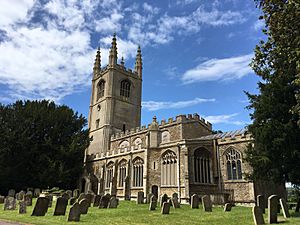All Saints Church, Conington facts for kids
Quick facts for kids All Saints' Church, Conington |
|
|---|---|

All Saints' Church, Conington, from the south-east
|
|
| Lua error in Module:Location_map at line 420: attempt to index field 'wikibase' (a nil value). | |
| OS grid reference | TL 179 858 |
| Location | Conington, Cambridgeshire |
| Country | England |
| Denomination | Anglican |
| Website | Churches Conservation Trust |
| Architecture | |
| Functional status | Redundant |
| Heritage designation | Grade I |
| Designated | 28 January 1958 |
| Architectural type | Church |
| Style | Gothic |
| Specifications | |
| Materials | Limestone and fieldstone |
All Saints' Church is an old church in the village of Conington. Conington is in the Huntingdonshire area of Cambridgeshire, England. This church is no longer used for regular services. It is looked after by the Churches Conservation Trust. This trust helps protect important old churches. The church is a Grade I listed building. This means it is a very important historical building. You can find it east of the village, near the A1 road and the East Coast Main Line railway.
Contents
History of All Saints' Church
A church was first mentioned in the Domesday Book of 1086. The Domesday Book was a big survey of England made by William the Conqueror. The church was rebuilt around the year 1500.
The top parts of the church walls, called embattled parapets, were fixed in 1638. This work was done by Sir Thomas Cotton. In 1841, the church was repaired and updated. This kind of work is often called a Victorian restoration. During this time, the old pews were replaced. A new window was added at the east end of the church in 1852. The church tower was made stronger in 1862. More repairs happened between 1897 and 1899.
Architecture of the Church
Outside the Church
All Saints' Church is built from limestone rubble and fieldstone. These are types of stone. It also has special limestone decorations. The church has a main area called a nave. This nave has four sections, or "bays." It also has a clerestory, which is an upper level with windows. There are side areas called north and south aisles. These aisles have small chapels at their east ends. The church also has a chancel (where the altar is) and porches on the north and south sides. There is a tall tower at the west end.
The tower has four levels. Its base is decorated with a quatrefoil pattern, which looks like a four-leaf clover. At the corners of the tower are half-round towers called turrets. These turrets rise up to pointy tops called crocketted pinnacles. The top of the tower has a battlemented parapet, like a castle wall. It also has a quatrefoil pattern and gargoyles. Gargoyles are stone carvings that often act as water spouts.
At the bottom of the tower, there is an arched doorway. Above this door is a large window with five sections of glass. The bell openings at the top of the tower have four sections of glass. The clerestory has three windows with three sections and one window with five sections on each side. Along the south aisle, there are three windows, each with four sections. The south chapel has a four-section window on its south side and a five-section window on its east side. Between the aisle and the chapel, there is a small tower called a rood turret. It has a many-sided roof and a decorative top. The south porch is small and has a pointed roof. The chancel has three-section windows on its north and south walls. Its east window has been repaired.
Inside the Church
Inside the church, there are arcades. These are rows of arches that separate the main nave from the side aisles. The arches at the west end are wider than the others. In the south wall of the chancel, there is a sedilia. This is a set of three seats for the clergy. There is also a piscina, which is a basin used for washing communion items.
The font is made of limestone and has eight sides. It was made in the 15th century. It stands on a base that was added in the 19th century. Inside the church, you can also see monuments to the Cotton and Heathcote families. Most of the church's furniture was added in 1841. The organ was built by a company called Miller and Son from Cambridge.
The church has a ring of six bells. All of them were made by Thomas Mears II at the Whitechapel Bell Foundry. Five of the bells were cast in 1827, and the sixth was made in 1834. The church clock was made in 1801 by a company called Vulliamy of London.
Images for kids
 | William L. Dawson |
 | W. E. B. Du Bois |
 | Harry Belafonte |


